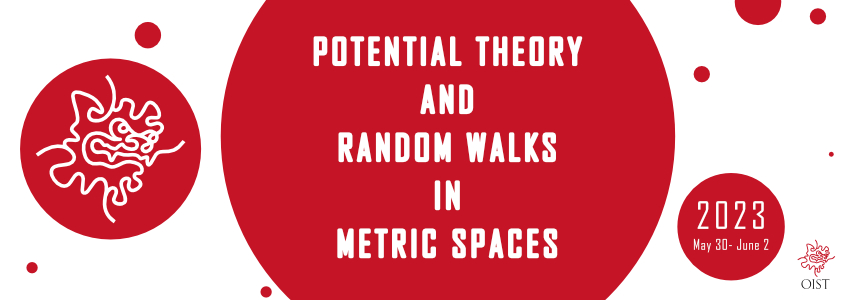2023 Workshop

Potential theory and random walks in metric spaces
距離空間上のポテンシャル論とランダムウォーク
May 30-June 2, 2023
Registration Schedule Speakers Talks Photos
OIST campus will be closed on Thursday and Friday due to the typhoon. All talks will be online on Thursday and Friday. You can obtain a zoom link from here.
Around the late 20th century, various Euclidean theories were pushed into metric spaces. The generalization provided fundamental new insights. In the process, analysis on metric spaces arose as a broad and vibrant field focused on studying the newly found objects. Potential theory, and the theory of random walks, are two intertwined strands of this theory with applications in diverse areas such as theoretical computer science, nonlinear PDE, geometric analysis and geometric group theory.
The aim of this workshop is to bring together a number of top class mathematicians working in analysis on metric spaces, with a focus on three areas i) random walks on fractals ii) potential theory on metric spaces and iii) applications and connections of the previous two to PDE and beyond. The speakers include both senior speakers, and junior speakers with recent and fundamental work. The aim is to build new collaborations and chart new paths for future research. This is supported by bringing in experts from different communities.
We plan to have mini-course, invited talks and contributed talks by leading mathematicians, and junior speakers with proven potential. This workshop will act as a platform to introduce recent advances and trends in this field and is likely to inspire outstanding and valuable collaborations. The talks by younger researchers provide the opportunity for early-career mathematicians to present their research and facilitate communication among the participants. Additionally, by inviting junior participants we will give them opportunities to build networks and international collaborations. These activities are particularly important after the pandemic has reduced mobility for the past two years. Further, the mini-course would introduce participants and speakers to new tools at the forefront of research.
Organizers:
Sylvester Eriksson-Bique, University of Jyväskylä
Panu Lahti, Chinese Academy of Sciences
Xiaodan Zhou, OIST



